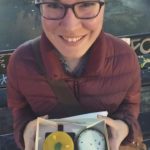In November 2017, the NSF Big Data Innovation Hubs held a workshop in conjunction with the European Big Data Value Forum 2017, and in collaboration with the EU Big Data Value Association (BDVA), PICASSO Project, and INRIA. The workshop brought together academic and industry actors from the US and the EU to share ongoing big data research and innovation efforts, to discuss effective models for bridging data science workforce needs with the academic discipline of data science, and to determine how to best support academia-industry collaborative research programs. Graduate student Chloe Rotman from the Northeast Big Data Hub’s region attended the meeting, and provides her perspective, below.
When I arrived at INRIA for the BDVA Workshop, I wasn’t sure what to expect. As a MLIS candidate and a metadata researcher at the Metadata Research Center at Drexel University, my professional experience with Big Data was centered on working towards a universal licensing agreement for sharing data sets. It seems general, but relevant to the task at hand. I was excited to learn about the common ground among biomedical researchers, tech executives, social scientists, etc.
I was assigned to the “Education and Workforce Development” break out group, where participants shared frustrations and brainstormed solutions for how to educate and train a generation of skilled, flexible data scientists. It was very clear that the biggest measure of success in any Data Science program will not be to teach mastery of specific technologies or tools, but rather to graduate a workforce that can adapt their skills to an ever-changing technical landscape. As a new graduate, there was certainly a personal advantage to participating in in-depth conversations about what the future of the field might look like.
The research areas addressed by the discussion groups were diverse: from designing smart cities to gathering healthcare data. But when everyone came together to share their findings, the outcomes were fairly universal. Whether in Europe or the United States, researchers, professors, and professionals are not just looking to improve privacy and efficiency, but they are truly excited to collaborate on projects and share data that will bridge the gaps between fields and make significant changes to our society.
—

The author enjoys one of the perks of the trip – French pastries!
Chloe Rotman, MLIS is a research assistant at the Metadata Research Center at Drexel University and a librarian. Her interests include ontologies, metadata, and pitbulls.
All photos by Chloe Rotman.
